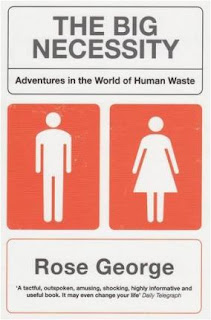The Big Necessity: Adventures in the World of Human Waste
The
book focuses on practices of sanitation (i.e., toilets) in the world (or lack
of them) and why this impacts everyone on the planet, as well as the planet
itself.
This
seems like an unusual topic (one of the reasons it interested me), but also one
that’s important yet rarely talked about. George refers to this many times
throughout the book (“… we refuse to notice that we still don’t know how to
properly deal with something that we all produce, up to several times a day,
many million years after we first started producing it.”).
However,
some of the data she presents indicates why this should change. Lack of sanitation
– or poor sanitation – affects almost everything about our lives, even if we
live in a society that has effective sanitation. She starts with the statistic
that 2.6 billion people don’t have sanitation. And then qualifies it:
“I
don’t mean that they have no toilet in their house and must use a public one
with queues and fees. Or that they have an outhouse, or a rickety shack that
empties into a filthy drain or pigsty. All that counts as sanitation, though
not a safe variety. … Four in ten people have no access to any latrine, toilet,
bucket or box. Nothing. Instead, they defecate by train tracks and in forests. They
do it in plastic bags and fling them through the air in narrow slum alleyways. If
they are women, they get up at 4 a.m. to be able to do their business under
cover of darkness for reasons of modesty, risking rape and snakebites. Four in
ten people live in situations where they are surrounded by human excrement,
because it is in the bushes outside the village, or in their city yards, left
by children outside the back door. It is tramped back in on their feet, carried
on fingers onto clothes, food and drinking water. The disease toll of this is
stunning.”
It’s interesting
that George refers to ‘famous’ people who support access to clean water in the
world, but never mention sanitation or the lack of toilets even though that’s
the main reason that the water is contaminated. Again, as George writes, no one
likes to talk about toilets or what they’re used for – even though every human
being needs to defecate.
I
was surprised to learn that contaminated water is not only a problem in
third-world countries. George relates the situation in Galway, Ireland in 2007,
when the city’s drinking water was contaminated with a parasite called
cryptosporidium, a disease-causing protozoa that can travel in feces. Or that
until 2005, Milan, Italy was still discharging raw sewage into the river
Lambro. And Brussels, Belgium, started to build a treatment plant for its
sewage only in 2003.
While
it’s true that 90% of the third-world’s sewage ends up untreated is oceans,
rivers and lakes, the situation is not much better in developed countries. George
writes that “Sanitation in the Western world is built with pipes but on
presumption. Despite the technology, the engineers and the ingenuity of modern
sanitary systems, despite the shine of progress and flush toilets, even the
richest, best-equipped humans still don’t know what to do with sewage except
move it somewhere else and hope no-one notices when it is poured untreated into
drinking-water sources. And they don’t.”
It
follows that there is also a lot of information about the types of diseases caused
by this situation, and the numbers of deaths in the world related to such a
lack of sanitation.
Some
of the detail in the chapters on sewer workers in various parts of the world
felt too excessive for me and I started to skim over parts of it. But more
interesting for me were the stories about people who are trying to make a
difference in their parts of the world and all the obstacles they face.
Rose
George writes in an accessible manner, with personal input but without being
flippant or trying to be humorous. She has done extensive research, has
travelled throughout the world to observe and conduct interviews and has
written a book that is both extremely informative and rather depressing.


Comments
Post a Comment